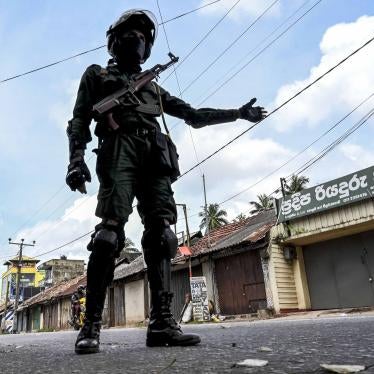(Washington, DC) - Congress should quickly pass legislation that would ensure US government contractors who commit felonies in Iraq and Afghanistan can be prosecuted in US federal courts, Human Rights Watch said today. A vote on such legislation is expected in the House of Representatives on Wednesday, October 3.
“It’s time to close the legal loopholes that allow contractors in Iraq and Afghanistan to commit crimes with impunity,” said Jennifer Daskal, senior counterterrorism counsel at Human Rights Watch. “Illegal and abusive conduct should not go unpunished.”
An estimated 180,000 private contractors working in Iraq are immune from local criminal prosecution for criminal conduct because of regulations originally imposed by the US government. Thousands more in Afghanistan have immunity because of a US-Afghanistan agreement. In addition, a patchwork of US federal laws leaves many contractors effectively immune from prosecution in the United States as well.
Legislation sponsored by Rep. David Price (D-NC) would partially address this situation by extending the reach of a federal law, called the Military Extraterritorial Jurisdiction Act (MEJA), to cover all US contractors overseas. Currently, only Department of Defense (DOD) contractors and other contractors supporting US forces are explicitly covered by the law. Thousands of contractors employed by other US agencies may be immune from prosecution in US courts when they commit felonies outside the territorial jurisdiction of the United States.
The issue of criminal offenses by US contractors garnered national attention last month when employees of the American security firm Blackwater allegedly shot and killed 11 Iraqi civilians. Under Iraqi law, initially imposed by US occupation authorities in 2004, all non-Iraqi contractors are immune from prosecution in Iraqi courts. Because the Blackwater employees were contracted by the State Department – not DOD – prosecutors must first establish that they are acting in support of DOD in order to bring a case under MEJA. Alternatively, if it were determined that their acts were grave breaches of the Geneva Conventions, they could be prosecuted under the US War Crimes Act, but to date no one has been prosecuted under this act.
Price’s legislation (HR 2740) would clarify that any US contractor who commits a felony while operating in Iraq or Afghanistan is liable to federal criminal prosecution under MEJA, regardless of what agency issued the contract. The bill would also require the Federal Bureau of Investigation to establish on-the-scene teams in those countries to investigate alleged criminal misconduct and fatalities linked to US contractors, which would greatly enhance the ability of the Department of Justice to hold accountable those who violate the law.
“The legislation would be an important first step by Congress to address the legal vacuum in which US contractors operate,” said Daskal. “But it will need to be accompanied by increased enforcement by the Department of Justice.”
To date, there has been only one successful prosecution of a contractor under MEJA – the conviction of a Department of Defense contractor in Baghdad who pleaded guilty to possession of child pornography in 2007. And despite widespread allegations of contractor involvement in abuse of detainees in Iraq and Afghanistan, only one – David Passaro, a CIA contractor – has yet been convicted for detainee abuse. He received eight years of imprisonment for beating a detainee to death in Afghanistan. The government’s case against Passaro could go forward because the abuse occurred on an Army base, which is considered part of the territorial jurisdiction of the United States and thus covered by other US laws, not just MEJA.
At least 17 other cases of alleged detainee abuse carried out by civilian contractors have been under review by the Department of Justice for at least two years without action. In several of these cases the Army had already found probable cause that a crime had been committed before referring the cases to the Department of Justice.
“The Bush administration’s willingness to turn a blind eye to criminal activity and abuse by US government contractors undermines its stated goal of winning hearts and minds,” said Daskal.
Human Rights Watch said it remained concerned by the broad immunities provided to private contractors in Iraq and Afghanistan. By shielding these contractors from local prosecution, Washington has effectively accepted responsibility for ensuring that those who commit criminal offenses are prosecuted under US law. To date, it has failed to do so. In order to ensure that the rights of Iraqi and Afghan nationals are fully protected by the law, the United States should work with the Iraqi and Afghan governments to lift these immunities to allow prosecutions by local authorities at least when the US does not do so.
The US government should also set up a system for civilians to seek compensation when contractors destroy their property or cause death or injury. A similar system already exists for damage done by US armed forces.
Have your say on this issue in the Human Rights Watch/Washington Post forum.






